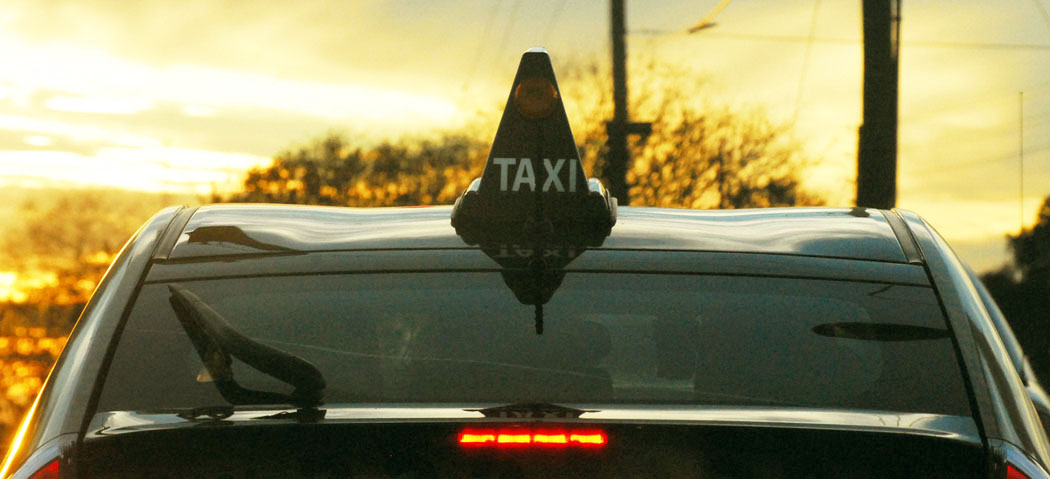Early this year, a fleet of 2013 Toyota hybrid taxis hit the streets of downtown Raleigh.
They let riders book via mobile app and pay with their smartphones, and equipped drivers with GPS and Google Nexus 7 tablets with trip information, bill processing and other communication tools.
In many ways, Taxi Taxi exemplified what city leaders hoped for when they passed a series of ordinances in 2009 to professionalize the local taxi industry. The cars were new, use the latest technologies, and they gave visitors from out of town the same transit experience they’d have in New York, Washington D.C. or Boston, but at a much lower cost.
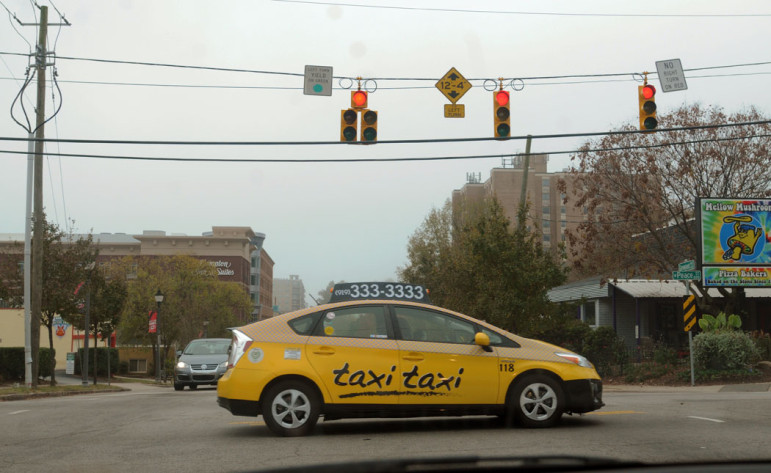
Karen Tam / Raleigh Public Record
A TaxiTaxi crosses Glenwood at Peace Street.
It also symbolized a growing trend in Raleigh. With 70 restaurants in downtown’s core seven blocks and 300 in neighborhoods surrounding it, active event schedules at the Red Hat Amphitheater and Raleigh Convention Center and frequent festivals and events on Fayetteville Street, downtown Raleigh has finally become a destination.
The number of visitors to Wake County is up 20 percent since 2009, and demand for hotel rooms is up 15 percent.
“People are coming downtown to be downtown,” said Julie Brakenbury, director of services for the Greater Raleigh Convention and Visitor’s Bureau. “Taxi service is hugely important to their experience.”
City of Raleigh data is proving that trend. Taxi Taxi’s drivers were among the 169 to join the city’s cabbie ranks this year, representing a 21 percent increase in licensed drivers in Raleigh. And since 2006, the number of taxi companies has grown from 35 to 110.
But with more demand and competition comes new challenges. And some taxi companies aren’t convinced the city is ready to handle them.
Representatives of Cardinal Cab, among Raleigh’s largest and oldest taxi companies with 80 cars, appeared last summer before the city’s Budget and Economic Development Committee to request the first meter increases since 2006. And to the taxi inspectors housed within the Raleigh Police Department, they’ve requested more city oversight over taxi companies and unregulated private cars and limousines, which they say are increasingly operating like cab companies on the streets.
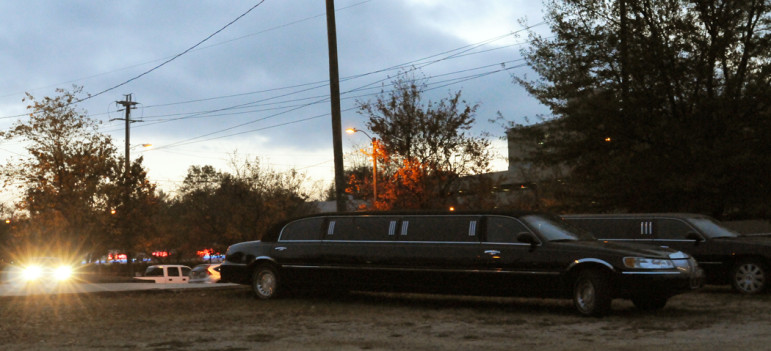
Karen Tam / Raleigh Public Record
Limos parked near the 42nd St. restuarant.
“We face a lot of threats,” said Cardinal partner David Matoke, who runs the company with his brother Kephas. “But the city is turning its head instead of really tackling what is facing this industry. We want fairness.”
Higher Rates
Matoke said the costs of operating his company have risen 30 percent since 2009. Yet, the city’s base meter rate has stayed $1.95, with $2.50 per mile and a 25-cent, per-minute fee while waiting for a rider. According to an April 2012 analysis by USA Today, Raleigh has the fourth-lowest one-mile taxi fare of the nation’s 60 largest cities, at $4.51.
But since 2006, gas prices have risen at least $1 per gallon. Cars, which Cardinal typically replaces every five years (Raleigh requires them be no more than 10 years old), cost more, and the price of accessories like adding a logo, top light, meter, radio and computer have risen.

Karen Tam / Raleigh Public Record
The city’s own fees have grown under the 2009 ordinances. A decal for each car now costs $25, up from $15. The cost for a driver’s permit rose from $25 to $150. A criminal record check is $25, up from $10. And a driving record report is $15, up from $10.
“It’s forcing us to cut corners, like cutting hours from employees and laying off dispatching staff to stay afloat,” Matoke said.
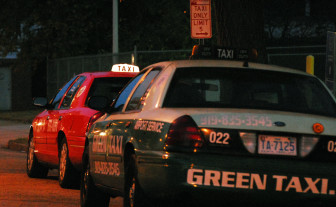
Karen Tam / Raleigh Public Record
Taxis line up on Harrington Street near the Greyhound Bus terminal.
Rates would have to double for the company to make a small profit and be positioned to handle more cost increases during the years until another rate increase is approved.
Taxi Taxi of Raleigh’s General Manager Fred Platt agrees that existing fares aren’t fair for drivers, who typically lease cars from taxi companies and keep the majority of rider fees. He’d like for Raleigh to begin charging riders for time stuck in traffic or at stoplights (the meter currently stops), like in Charlotte, or to require an additional fee for carrying more than two passengers, which would incentivize vans.
“They are not making the money they should be making,” he said. “Either the city should increase the rate, or allow the meters to run hot.” By “run hot” Platt means allow the meters to keep charging when the cab is at a red light or stuck in traffic.
More Regulation
Matoke would also like the city to consider a cap on the number of taxis or taxi companies in town, and to consider an ordinance that would require limos, black cars and other passenger vehicles to follow the same rules as taxi companies.
Durham City Council caps the number of taxis that can operate in the city at 180, with an annual review process for raising the number. And last December, after lobbying by local taxi companies and despite scrutiny by the North Carolina Institute for Constitutional Law, it approved an ordinance to regulate shuttle, limo and for-hire vehicles the same as it does taxis. That means requiring permits, background checks and annual inspections.
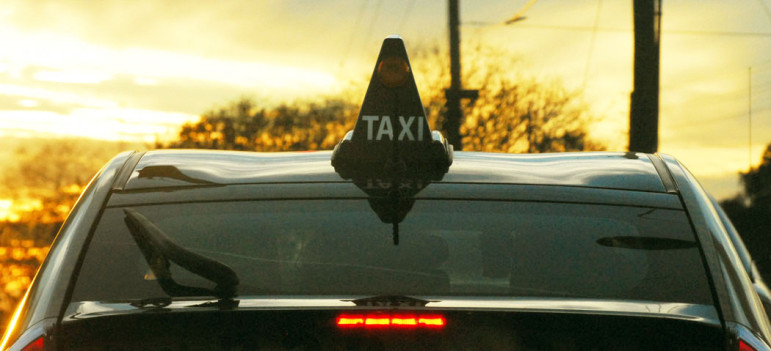
Karen Tam / Raleigh Public Record
Matoke is fearful that a company called Uber, which uses a smartphone app to connect private drivers with passengers, might come to town. The national mobile app provider for private cars and other passenger transport services entered Charlotte in September and has interest in Raleigh, according to its spokesperson Nairi Hourdajian.
It could enter the market with Uber Black, its high-end car service, or UberX, which offers a lower-cost option and ride-sharing. In either case, drivers are required to meet Uber’s screening process—background checks, insurance verification, vehicle inspections and a city knowledge exam—before they get access to the mobile app.
In other cities, it has met resistance from existing taxi companies and sometimes even city leaders, for enabling private car operators to act like taxis by using its mobile application to field calls for rides.
“Whatever the existing frameworks are, we operate within them,” Hourdajian said. “What’s most important to us is the fact that there is consumer demand, driver interest and cities with more economic opportunity.”
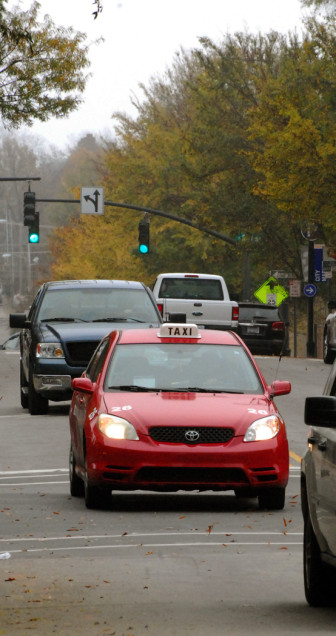
Karen Tam / Raleigh Public Record
A taxi drives down Martin Street near Moore Square.
No Changes, Yet
So far, no rate increases have been approved in Raleigh, and no further oversight of the industry is being considered.
City police spokesman Jim Sughrue said the taxi inspectors recently compared Raleigh’s rates to those in other North Carolina cities and found them to be reasonable.
The inspectors compared a 15-mile trip in this region to rates in Greensboro, Winston-Salem, Wilmington and Charlotte. Raleigh’s fees were only lower than Charlotte’s, and it’s a much larger city.
Mayor Nancy McFarlane, chair of the city’s Budget and Economic Development Committee, is content with that result. After all, Raleigh is best compared to its neighbors, she said. And a lower taxi rate is a benefit for attracting visitors from out of town, or new residents to town.
As for private car regulation or a taxi cap, Sughrue said both were considered several years ago by the City Council’s Law and Public Safety Committee, but the city decided not to regulate.

McFarlane said she is hoping for further guidance on that issue from new city manager Ruffin Hall, who has experience dealing with transit issues in his prior role in Charlotte.
“We are really in this phase of growing pains,” she said. “We’re seeing more and more things like this as we get larger, and it’s really helpful to see what other cities have done.”
